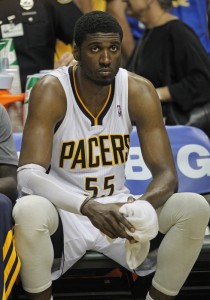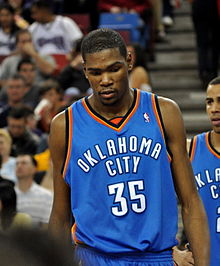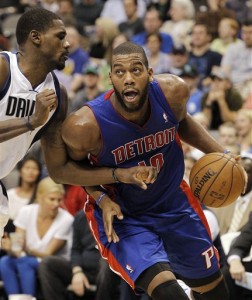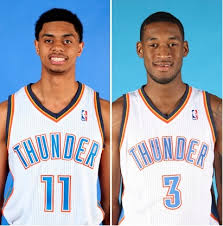 Championship contending windows in the NBA typically close a lot sooner than anyone thinks.
Championship contending windows in the NBA typically close a lot sooner than anyone thinks.
Take the Indiana Pacers, for example. Entering last season, Indiana was considered an elite team perhaps still a year or two away from hitting its prime as a true title contender.
The Pacers started out hot, became the early season championship favorites, bought into their own hype, made a couple of short-sighted trades and eventually fizzled.
In the following months, Roy Hibbert went from All-Star center to meme extraordinaire, Lance Stephenson abandoned ship for more buzz in Charlotte and the indispensable Paul George tragically broke his leg during a USA Basketball showcase.
Now the Pacers sit on the outside of everyone’s championship projections – certainly for 2014 and, most likely, for years to come. The window is closed for a while.
Despite the widespread understanding that title windows close quickly in the NBA, small market contenders almost always avoid making the high-risk, high-reward trade that could turn them into immediate championship favorites. In general, contenders have taken their cushy spot amongst the elite for granted – or as an excuse to stay conservative by pinching pennies.
And while the hired gun philosophy has become commonplace in baseball, the philosophy has yet to gain traction in the NBA in spite of success in limited opportunities.

Dikembe Mutombo with the 76ers in 2001 and Rasheed Wallace with the Pistons in 2004 stand as the two most notable hired guns in recent memory. In those cases, both players had expiring contracts but were immediately re-signed in free agency – rendering the stars not so much “hired guns” as “long-term weapons.”
But even if Mutombo and Wallace were to have left their new teams in free agency, both the Sixers and Pistons would have considered the trades successful. After all, both big men turned contenders into Eastern Conference champions. Detroit, of course, won it all.
Future “assets” – the buzzword du jour among GMs – are nice when there is no pressure to win immediately. But when the clock is ticking toward a star’s unrestricted free agency, there comes a point when you have to sacrifice those assets to salvage the blueprint you’ve almost completed.
Which brings us to why the acquisition of a hired gun in Oklahoma City could change the league drastically for years to come.
The Thunder stand to lose the most in the next two years if things don’t go right. Over the last three years, Oklahoma City has gone from a dynasty in the making to a potential cautionary tale for generations to come. If that sounds hyperbolic, consider that a year and a half has already passed since frustrated superstar Kevin Durant said that he was “tired of being second.”
Loud City can argue that injuries – to Russell Westbrook in 2013 and Serge Ibaka in 2014 – have done in their championship dreams the last two years. But now it is reigning MVP Durant who is hurt – sidelined for the season’s first six to eight weeks with a Jones Fracture – and Oklahoma City is arguably just as far from winning a championship as it was five years ago.
Over that same period, Oklahoma City’s front office has spent the least money on non-incumbent transactions of any team in the league.
The clock is ticking on Durant’s contract, which expires in 2016. GM Sam Presti has to prove to his superstar that the roster has not plateaued. If the Thunder fail, they could be looking at the specter of losing Durant and Westbrook to free agency in consecutive summers.
With the NBA’s lucrative new TV deal projected to considerably inflate the salary cap, Durant’s  hometown Washington Wizards – already a prohibitive favorite for his services if he were to bolt OKC – now look even more realistic as a destination.
hometown Washington Wizards – already a prohibitive favorite for his services if he were to bolt OKC – now look even more realistic as a destination.
Considering that John Wall and Bradley Beal will be locked up and that Washington would still be able to create a max salary slot in the perennially weaker Eastern Conference, it’s hard to imagine Durant not considering the move.
Oklahoma City’s summer was not a textbook example of how to keep a superstar happy. The Thunder tried to lure Pau Gasol with their mid-level exception but failed. They gave a portion of that to shooter Anthony Morrow and kept their two first-round picks, including one who projects as a fringe roster player whom they only drafted in order to avoid having to pay his guaranteed salary.
With Durant out until December – and Morrow and Reggie Jackson also sidelined – Oklahoma City faces a realistic possibility of squandering home court advantage for the playoffs. With the Spurs returning their entire roster and the Clippers revamped with a new owner willing to spend, the Thunder could be looking at the third seed – or worse – in the loaded West.
Which is why, more than ever, Oklahoma City absolutely needs to add a hired gun alongside Durant, Westbrook and Ibaka. And that’s where Pistons big man Greg Monroe comes in.
Monroe, 24, should already be locked into a long-term restricted free agent deal worth somewhere in the range of $11 million to $15 million annually. In an exclusive conversation with Sheridan Hoops, Monroe confirmed an offer was on the table to stay in Detroit for the long haul.
However, the fit and price weren’t right for Monroe’s camp. He instead opted to accept his qualifying offer, a seldom-used clause in the CBA that allows players to enter unrestricted free agency after their rookie contract expires.
So while Monroe is an impending unrestricted free agent, he is only costing Detroit $5.48 million this season – making him one of the best bargains in the NBA.
 To make matters even juicier for a trade, the Pistons have a logjam of big men and – with Andre Drummond steadily progressing and Josh Smith contractually locked in for three more seasons – Monroe looks like the odd man out.
To make matters even juicier for a trade, the Pistons have a logjam of big men and – with Andre Drummond steadily progressing and Josh Smith contractually locked in for three more seasons – Monroe looks like the odd man out.
Here’s where things get tricky. Players pushed to a qualifying offer receive almost complete control in trade talks. Monroe can veto a trade, but if he approves a trade he must waive his Bird Rights, which impacts his potential new team. Most teams with a rumored desire for Monroe are too far away from contending to convince him to waive the no-trade clause.
“To say I’m sick of losing would be an understatement,” Monroe told Sheridan Hoops. “I think everybody at this level wants to win. To not win as much as I’ve wanted to over these past few seasons has been definitely tiring.”
That’s good news for the Thunder. After three seasons in Detroit without ever winning more than 30 games, Monroe would likely waive his no-trade clause to ensure a winning situation for the rest of the season, even if the Thunder can only afford him as a rental – which is a distinct possibility. Oklahoma City has been notoriously frugal as it is one of only five teams to have never paid the luxury tax since 2002.
Monroe’s $5.48 million contract, however, makes him one of the few difference-makers who is not only affordable but would also perfectly for the Thunder’s roster. At 6-11, he is a gifted interior presence with elite passing skills for a big man. He averaged 3.5 assists in 2012-13 before last summer’s signings killed the team’s spacing.
Monroe can still score and rebound among the league’s best bigs (15.2 points with 9.3 rebounds in a down 2014 season) but would be better suited for a team stocked with perimeter shooters and slashers. His biggest deficiency comes on defense.
To put it kindly, Monroe is not an intimidating interior presence. He averaged just 0.6 blocks and allowed 51.6 percent of shots at the rim, both ranking among the league’s worst for starting bigs last season. However, the presence of Ibaka would mask his porous defense while illuminating his offense.
Ibaka is annually considered a candidate for Defensive Player of the Year. Last season, he led the league with 2.7 blocks and ranked fourth among all big men in opponents field-goal percentage at the rim (45 percent). He also has been moving his offensive game away from the rim. Last season, only 33 percent of Ibaka’s 978 shots came within three feet while he shot 46 percent on attempts of 10 feet or more.
Monroe also has missed just three games – college and pro – over the last six years, a level of durability the Thunder need.
Does Monroe seem too pricey for the Thunder in terms of assets? Maybe not when you consider Detroit has to prepared for the  possibility of losing him for nothing in free agency, so he may never be more affordable. The Pistons could be willing to trade Monroe – if he approves the deal – for a collection of budding role players, which the Thunder have.
possibility of losing him for nothing in free agency, so he may never be more affordable. The Pistons could be willing to trade Monroe – if he approves the deal – for a collection of budding role players, which the Thunder have.
From top-tier assets like Steven Adams and Reggie Jackson (who may be off limits) to slightly less touted assets like Mitch McGary, Jeremy Lamb, Andre Roberson, Perry Jones III and Josh Huestis, the Thunder can offer the Pistons young depth for a roster that Stan Van Gundy is in the process of overhauling.
Factor in that Oklahoma City has all of its future draft picks, and it’s clear the two teams have the ingredients to make a trade work.
“I definitely want to go somewhere that gives me a chance to win,” Monore said. “And that might be here [in Detroit]. But, like I said, I’ll get to that when it’s time.”
For Oklahoma City, the time is now. If they want to preserve their future, they have to capitalize on an open window in the present.
Jacob Eisenberg is a senior at Emory University in Atlanta and covers analytics within the NBA for Sheridan Hoops. Give him a follow on Twitter @eisenberg43 and check out his website as well.